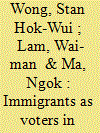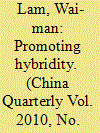|
|
|
Sort Order |
|
|
|
Items / Page
|
|
|
|
|
|
|
| Srl | Item |
| 1 |
ID:
158538


|
|
|
|
|
| Summary/Abstract |
Migration to electoral autocracies has become increasingly common. Extant studies, however, accord little attention to the immigrants' influences on the domestic politics of these regimes. We argue that immigrants have attributes (status quo bias and lack of prior exposure to local politics) that make them an attractive co-optation target of the authoritarian regime. We provide a case study of mainland Chinese immigrants in Hong Kong to illustrate our argument. Since the sovereignty transfer, the Hong Kong government has devised various schemes to attract these immigrants, while pro-establishment political parties and groups have actively sought to co-opt them. Using two distinct public opinion surveys, we also find that immigrants are more likely to approve of the political and economic status quo, and less likely to vote for pro-democracy opposition parties than the natives. In addition, we find no evidence that exposure to political information can change the immigrants' vote choice.
|
|
|
|
|
|
|
|
|
|
|
|
|
|
|
|
| 2 |
ID:
188956


|
|
|
|
|
| Summary/Abstract |
The resilience of non-democratic regimes in the past decades demonstrates that some authoritarian regimes have figured out ways to consolidate regime support without democratic elections. Hong Kong is a remarkable case of “legitimacy without democracy” as the system of government enjoyed a certain level of legitimacy since colonial days without being democratically elected. Using Hong Kong as a case and based on data from several waves of Asian Barometer Survey (ABS), this study analyzes the impact of citizens’ evaluation of the economic conditions, perception of freedoms, perceived procedural justice and institutional trust, and stability concerns on diffuse regime support in Hong Kong. There are three key findings of this study. First, economic performance is not a significant predictor of diffuse regime support in the case of Hong Kong, whereas, second, institutional trust and perceived civil liberties are. Finally, we found indirect evidence for the role of stability in shaping regime support, although its importance seems far less important than institutional trust and civil liberties
|
|
|
|
|
|
|
|
|
|
|
|
|
|
|
|
| 3 |
ID:
132065


|
|
|
|
|
| Publication |
2014.
|
| Summary/Abstract |
This article examines the contributions of nongovernmental international human rights organizations (NGIHRO) in promoting a broad sense of human rights in hybrid regimes using the cases of Amnesty International Hong Kong (AIHK), Green Peace Hong Kong (GPHK), and Oxfam Hong Kong (OHK). It contends that NGIHROs have made significant contributions to public education and fund-raising in Hong Kong. However, with regard to the human rights conditions, it is erroneous to consider Hong Kong as part of the developed world. Together with other probable political considerations, doing so may have led to gaps in the organizations' roles and functions as advocates for human rights in Hong Kong. In the final analysis, this article uses the political protests in Hong Kong to illustrate the importance of addressing the implications of demands for preserving the local identity and alternative lifestyles in the broader understanding of human rights.
|
|
|
|
|
|
|
|
|
|
|
|
|
|
|
|
| 4 |
ID:
100503


|
|
|
|
|
| Publication |
2010.
|
| Summary/Abstract |
This article traces the unique process of reconstructing the identity of the Macau Special Administrative Region and its people after the political resumption to China in 1999, and the political and economic significance of the reconstruction. As in other postcolonial contexts, identity is an arena of political contest where various discourses that embody re-appropriation of political traditions and legacies criss-cross. In Macau, the post-handover identity comprises the local, the national and the international components, with Macau characterized as a historical, colonial/cultural hybrid and economic object. In fact, the Macau identity after 1999 represents a re-appropriation of the image of colonial Macau propagated by the Portuguese administration since the 1980s. Also, identity making has been a process of incorporating instead of repressing or eliminating the identities of "the other," and building a stand-alone national identity is not the prime task in the reconstruction of an identity. Rather, multiple identity components are deliberately incorporated and promoted. The success of the process has fabricated Macau's relatively smooth reintegration with China and enhanced the legitimacy of its new government.
|
|
|
|
|
|
|
|
|
|
|
|
|
|
|
|
|
|
|
|
|